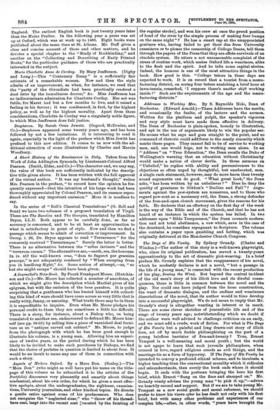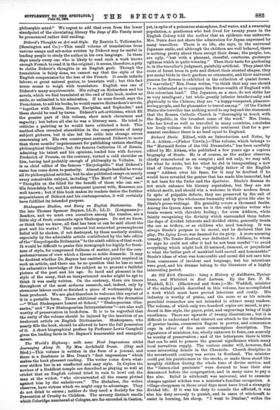The Days of His Vanity. By Sydney Grundy. (Chatto and
Windus.)—The author of this story is a well-known playwright, who, since its original publication, has served a twenty-years apprenticeship to the art of dramatic plot-weaving. In a brief preface Mr. Grundy explains that the reappearance of his novel, which he modestly declares is not a novel, " but a passage in the life of a young man," is connected with the recent production of his play, Sowing the Wind. But beyond the central incident of the old man's story of his illicit love and its direful conse- quences, there is little in common between the novel and the play. Nor could one have judged from the loose construction, the want of dramatic dialogue, and the endless and wearisome dissertations of the novel, that its author would in time develop into a successful playwright. We do not mean to imply that Mr. Grundy's story is altogether wanting in interest or in merit. There are some clever sketches of journalistic life and of the stage of twenty years ago; notwithstanding which we doubt if the author were well advised to challenge criticism on an early, and we must add a crude, work of fiction. For what is The Days of His Vanity but a painful and long drawn-out story of illicit love, set off by much feeble philosophising on the part of a young briefless barrister of five-and-twenty True, Ernest Tempest is a well-meaning and moral youth ; but the world is not agape to learn that such juvenile philosophers, when crossed in love, regard religious creeds as evil things, and the marriage-tie as a form of hypocrisy. If The Days of His Vanity be intended to convey a profound ethical scheme, and to inculcate a higher teaching than the conventional morality which it ridicules and misunderstands, then surely the book ends where it should begin. It ends with the postman bringing the hero his first brief, which Ernest " flung on the floor and stamped on." Mr. Grundy wisely advises the young man " to pick it up,"—advice we heartily second and support. But if we are to take young Mr. Tempest as a new social guide and moral reformer, we should prefer to know his views after he has dealt not only with his first brief, but with many other problems and experiences of our complex life,—after, in other words, " years have brought the



















































 Previous page
Previous page